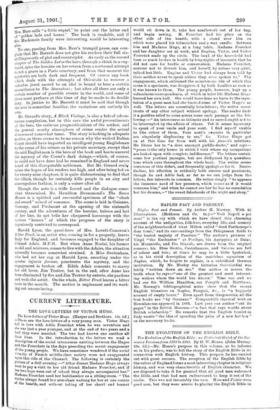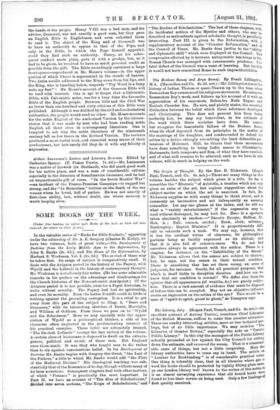THE EVOLUTION OF THE ENGLISH BIBLE.
Tie Evolution of the English Bible : an Historical Sketch of the Suc cessive Versions from 1382 to 1885. By H. W. Hoare. (John Murray. 10s. 63.)—Mr. Hoare's purpose in this volume, as he informs us in his preface, was to tell the story of the English Bible in its connection with English history. This purpose he has carried out with great success. The reception of the English Bible by the rulers of England forms a most interesting chapter in religions history, and was very characteristic of English character. We are disposed to take it for granted that all good men welcomed the Bible, and that bad men endeavoured to keep it out of the realm. This was not invariably the case. More and Fisher were good men, but they were averse to placing the English Bible in the hands of the people. Henry VIII. was a bad man, and his adviser, Cromwell, was not exactly a good man, but they gave an English Bible to Englishmen. and even exhorted them to read it. The object of the King and of Cromwell was to have an authority to oppose to that of the Pope, and only in the Bible, to which the Pope himself appealed. could they find such an authority. Henry, as his subse- quent conduct made plain, gave it with a grudge, but, as it bad to be given, he resolved to have as much personal credit as possible from the gift. The Bible accordingly contained a large frontispiece—reproduced in Mr. Hoare's volume—in the upper portion of which Christ is represented in the clouds of heaven. Two Latin scrolls addressed to the King come from his lips, and the King, who is kneeling below, responds "Thy Word is a lamp unto my feet" ! Mr. Hoare's account of the Genevan Bible will be read with interest. One is apt to forget that a Calvinistic Bible, with Calvinistic notes, was for a long time the favourite Bible of the English people. Between 1560 and the Civil War no fewer than one hundred and sixty editions of this Bible were published. Although it was disliked by the civil and ecclesiastical authorities, the people would read no other. Mr. Hoare accounts for the noble English of the Authorised Version by the circum- stance that it was made by men who had been reading noble English all their lives in contemporary literature. One is tempted to ask why the noble literature of the nineteenth century left so few traces in the Revised Version. The revisers produced a most useful book, and corrected many errors of their predecessors, but how rarely did they do it with any felicity of expression.



































 Previous page
Previous page